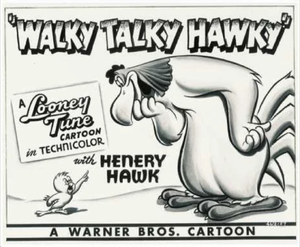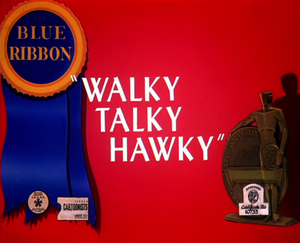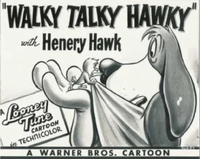Walky Talky Hawky
| Walky Talky Hawky | |
|---|---|
 Lobby card. | |
| Production company | Warner Bros. Cartoons |
| Distributor | Warner Bros. Pictures The Vitaphone Corporation |
| Release date | August 31, 1946 |
| Run time | 8:18 |
| Starring | Mel Blanc |
| Producer(s) | Edward Selzer |
| Music composition | Carl W. Stalling |
| Story | Warren Foster |
| Animation | Richard Bickenbach Arthur Davis Don Williams Cal Dalton |
| Director(s) | Robert McKimson |
| Series navigation | |
| ← Previous | Next → |
| Title card | |

| |
Walky Hawky Talky is the two hundred and sixty-fifth Merrie Melodies theatrical short. It was released by Warner Bros. Pictures and The Vitaphone Corporation on August 31, 1946. It was written by Michael Maltese, produced by Edward Selzer and directed by Robert McKimson.
An impressionable chickenhawk named Henry is sent by his father to find a chicken. During his hunt, he comes across a blabbering rooster, who tricks him into thinking that a dog is a chicken.
Detailed summary
Memorable quotes
Foghorn: You lose somethin', I say, you lose somethin', kid?
Henery: I'm a chickenhawk. I'm after my first chicken!
Foghorn: A chicken, eh? Well, I'm a horse, I say, I'm a horse myself! But I've seen a chick-, I SAY, I've seen a chicken around here-, pay attention sonny, somewhere.
Henery: Are you comin' quietly or do I have to muss ya up?
Foghorn: Well, there's the foxy chicken. We'll just have, I SAY, we just have to outsmart him!
Barnyard Dawg: Hubba, hubba, hubba! I'm no chicken! That's a chicken!
Foghorn: Don't you call m-, I say, don't you call me a chicken! You chicken!
Henery: Hubba, hubba, hubba, hubba!
Henery: One of those things, someone, I say, one of those things has got to be a chicken.
Characters
In order of appearance: | ||||||||||||
| ||||||||||||
Locations
- Earth
- United States
- Henery's residence
- Farm
- United States
Objects
- Looney Tunes/Merrie Melodies Comics
- Esquire magazine
- Watermelon
- Wooden plank
Vehicles
- None
Production
Development

After McKimson was promoted as a director in late 1944, Foster developed a story about a large rooster, a barnyard dog and the inclusion of Henery Hawk; the latter of which was originated by Chuck Jones for The Squawkin' Hawk.[1] The story was approved around the same time after Foster wrote it.[2]
Foghorn Leghorn's voice was initially inspired by a character known simply as "The Sheriff", played by Jack Clifford in the 1930s radio program Blue Monday Jamboree. However, for his next appearance in Crowing Pains, the rooster's vocal mannerisms and personality were directly inspired by Kenny Delmar's portrayal of Senator Claghorn, from The Fred Allen Show program. In a later interview, McKimson had likely misremembered the connection and referred to Claghorn as the personality basis for Foghorn.[1]
Filming
The dialogue was recorded on January 13, 1945.[1]
It was copyrighted in 1946 (MCMXLVI).
Music
The music was composed by Carl W. Stalling.
Crew credits
- Layouts: Cornett Wood
- Backgrounds: Richard H. Thomas
Release
Dates are in order of release:
- United States: June 22, 1946 in theatres
Behind the scenes
- The title is a play on the words "walkie-talkie" and hawk".
- Foghorn's voice sounds more harsher in this short, which resembled more on Mel Blanc's portrayal of Yosemite Sam.
- Foghorn is depicted with three front toes in his feet, instead of the usual two front toes in later shorts.
- Henery's line, "so round, so firm, so easy, so fully packed," is a reference to a tagline for Lucky Strike cigarettes in the 1940s.
- According to its animation draft sheet, the short was produced under the Looney Tunes series, but released under the Merrie Melodies label.[2] The lobby cards for the short also reflect this name discrepancy.
Errors
Critical reception
Accolades
| Award | Date of ceremony | Category | Recipient | Result |
|---|---|---|---|---|
| Academy Award | March 13, 1947 | Best Short Subject – Cartoons | Edward Selzer | Nominated |
Legacy
- Although this short served as the second cartoon entry for Henery Hawk, Foghorn and the Barnyard Dawg became the central focus of later theatrical shorts they appeared in. Henery served more or less as a secondary character in these cartoons until the 1961 short Strangled Eggs.
- While initially unnamed, Foghorn was given an alias for his third appearance in The Foghorn Leghorn.
Home availability
- In the United States:
- October 25, 2005: Warner Home Video releases Looney Tunes Golden Collection: Volume 3 on DVD.
- November 14, 2006: Warner Home Video releases Looney Tunes Golden Collection: Volume 4 on DVD.
- August 12, 2014: Warner Home Video releases Looney Tunes Platinum Collection: Volume 3 on Blu-ray.
References
- ↑ 1.0 1.1 1.2 Scott, Keith (July 24, 2023). "The Origin of Foghorn Leghorn". Cartoon Research.
- ↑ 2.0 2.1 Devon, Baxter (February 3, 2024). "Robert McKimson’s “Walky Talky Hawky” (1946)". Cartoon Research. Retrieved June 19, 2024.